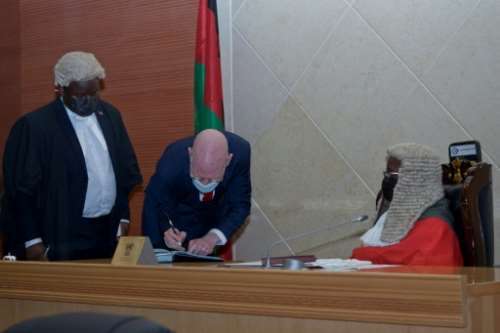An albino activist was sworn into Malawi’s parliament, a first in a country where people with albinism have suffered discrimination and killings. Overstone Kondowe won a by-election last month in central Malawi, a milestone after years of victimization.
Overstone Kondowe after his swearing-in said: “Being the first person with albinism elected in this kind of office, there is high expectations, not only in Malawi, but the whole world is looking forward to what I would do”.
“My last word to persons with disability, and in particular persons with albinism, they need not to underrate themselves. They need to work hard towards their goal. I remain a model to them and I will inspire them more so that they aim higher”.
Overstone Kondowe
President of Malawi, Lazarus Chakwera, also named Kondowe as his special adviser on people with disabilities. Speaking before the swearing-in ceremony, President Chakwera said:
“Overstone’s election is a giant step forward in the protection of human rights of people with albinism in Malawi and the Africa region as a whole. It shows that the context of discrimination is changing for the better for people with albinism in Malawi”.
Lazarus Chakwera

Malawi suffers a wave of assaults against albinos
Amnesty International, a global human rights activist organization, reported that more than 20 albinos have been killed in Malawi since 2014.
Amnesty in their reports revealed that in the past four months of this year, seven attacks against albinos have been recorded, ranging from killings, tampering of graves, attempted abductions, and physical violence.
People with albinism often face deep-seated discrimination in Malawi. As a result, they do not have the same opportunities for education and health care as others.
According to the report, many people in Malawi believe that albinism is contagious. They think that the bones of those with albinism contain gold, and they will kill, or rob graves, for them. Many will pay huge sums for their body parts, allowing a gruesome trade in human bones to flourish.
It is a trade driven by the growing demand for these body parts in southern and eastern Africa. The UN noted that from 2000 to 2013 it received 200 reports of ritual attacks on people with albinism across 15 countries, all in Africa.
That notwithstanding, some Malawians believe that albinism is caused by infidelity, or that it’s a punishment from the gods. Among the many insults directed at people with this skin condition are: “ghost”, “gold” and “money”.
Some albinos are also accused of being “vampires” who seek human blood for rituals, sometimes triggering vigilante violence in retaliation.
A woman speaking to Amnesty said: “My cousin’s child was called a ghost, which they thought was bringing bad luck to the school. She dropped out of school as a result. My cousin was afraid to go to the school to complain. She has six other children with albinism”.
Another man with albinism also said: “People tell me they will sell me. Someone said I was worth 6 million Malawian Kwacha. I felt pained that a price tag can be put on me”.
At the height of the attacks in 2016, Kondowe founded the Association of People with Albinism in Malawi to push the government to take action. Kondowe is the current chairperson of the association, African Union for Persons with Albinism.
Read also: Police Acted Unprofessionally in Attempt to Arrest Madina MP- Dr. Ateku





















